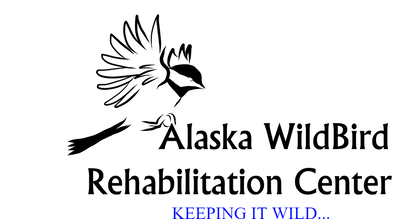Alaska WildBird Rehabilitation Center and Avian Influenza
A new highly pathogenic avian influenza (HPAI H5N1) has been rapidly spreading across the lower 48 states and has been found in Washington and British Columbia. Due to this threat, Alaska WildBird Rehabilitation Center has made the difficult decision to minimize wild bird rehabilitation for the spring and summer of 2022, effective April 30. This decision will be re-evaluated as the summer proceeds to see if we can once more take in injured birds. We are staying in communication with our veterinarian and other wild bird rehabilitation facilities around the state to track any changes or concerns.
This disease has been found in flocks of chickens and turkeys, leading to the death of millions of domestic fowl. Since these birds come into contact with wild birds, it is easily transmitted into the wild population.
Ducks and other waterfowl can be carriers, they will be infected but show no symptoms and pass on the virus to other birds. It is spread by all transmission vectors: air, water, feces and contact; and can live for an extended time on surfaces and in the air. The disease is usually fatal to non-waterfowl species which become infected, there is no known cure. Raptors seem to be particularly susceptible. Infected birds usually die within a few days. There are no accurate quick tests for the virus, so we will not know if injured birds brought in carry the virus until they show symptoms and at that point the virus will have been introduced into our facility.
Our main concern is for our resident education ambassador birds, all of which are affected species. We come into close contact with these birds on a daily basis as we feed, clean and train with them. A volunteer who inadvertently carries the virus on clothing can easily infect our ambassadors, effectively providing a death sentence. Our concern is that an infected bird on site could cause spread of the virus. We are not large enough and do not have the resources needed to operate under the strict sanitation protocols needed to prevent spread of the virus. For those reasons we will not be able to rehabilitate wild birds at our facility.
This is a zoonotic virus and can, though the risk is low with this strain, be passed on to humans when there is extended contact with infected birds. If you have domestic ducks or chickens, be careful of contact and wash clothing used to care for them. Poultry owners should check the State of Alaska website for the link to “protect the flock” for information on caring for their birds.
Thank you for understanding this most difficult decision. As soon as we are able to resume our rehabilitation activities we will notify the public through these same channels.
What to do if you find an injured bird or orphaned baby birds:
-If you find baby birds, please call us at 907-892-2927 for guidance. We will be caring for baby birds off site, we will assist you in getting them to the proper caretakers.
-Many window hit birds will recover on their own with time. If the bird is a known window hit, place the bird in a box or carrier with a towel to stand on, and cover it with a towel. Keep in a place protected from kids, pets and wild predators. In about an hour, see if the bird will fly out. It not, wait another hour or so, and try again. If it still doesn’t fly, the bird needs care as below.
-If you find an injured bird, it needs to be taken to Bird Treatment and Learning Center in Anchorage. They have been able to modify their facility and procedures to safely accept injured birds under some strict conditions. You may take these birds to them if you are able, but please call them first to verify where to bring them, some species are being treated off site. Their phone number is 907-562-4852.
-If you find a dead bird, check with the State of Alaska veterinarian to see if they are accepting carcasses for testing. Contact information is on the state website. Alternately, you could bury the bird without touching it.
